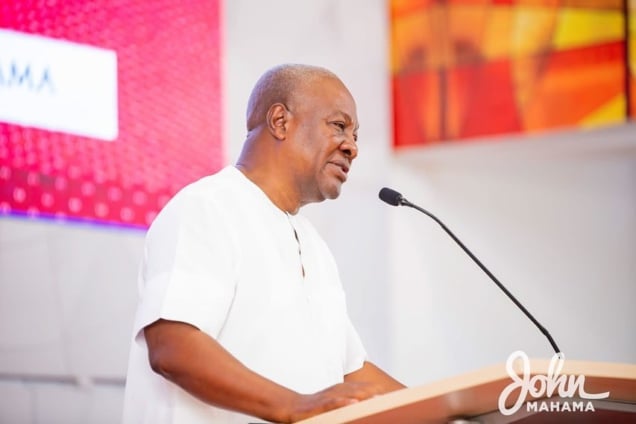John Dramani Mahama, the presidential candidate for the National Democratic Congress (NDC), has initiated a robust critique of the ruling New Patriotic Party (NPP) as he seeks to distinguish his party by emphasizing their core values of truth and integrity. Speaking at a campaign gathering in the Daboya-Mankarigu Constituency, Mahama highlighted a stark contrast between the NDC’s adherence to honesty and the NPP’s alleged tendency to manipulate public sentiment for electoral gain. He accused the NPP of resorting to telling voters what they want to hear, rather than cultivating a relationship built on transparency, which he perceives as an affront to democratic principles. Mahama’s statements reflect a broader campaign strategy aiming to engage with voters on the basis of honesty rather than mere political expediency.
Central to Mahama’s argument is the assertion that political deception compromises the essence of governance. He provocatively noted that the NPP’s rhetoric is akin to a crass exchange: promising to “sell your mother” for power, only to later “buy her back” once in office. By using this vivid metaphor, Mahama underscores the absurdity of prioritizing political ambition over genuine democratic discourse. This metaphor not only captures the attention of his listeners but also serves to reinforce the message that integrity should be paramount in leadership roles. The implications of this rhetoric suggest a call for voters to consider the moral implications of political promises and the character of those making them.
Mahama expressed that the NDC’s philosophy hinges on honest communication with the electorate. He affirmed that, unlike his opponents, his party does not shy away from acknowledging uncomfortable truths. According to him, genuine political leadership involves accurately representing both the successes and challenges faced by the nation. “If things are good, I will tell you that things are good. If things are not going so well, I will come back and tell you things are not going so well,” he explained. This approach seeks to build a rapport with constituents that is founded on realistic assessments rather than idealized narratives. With this message, Mahama aims to establish himself and the NDC as trustworthy representatives of the people’s interests.
As the elections on December 7 approach, Mahama’s call to the constituents of Daboya-Mankarigu is one of trust and accountability. He encourages the electorate to support the NDC by casting their votes based not on temporary promises but on the party’s commitment to truthfulness. Mahama’s rhetoric is part of a broader campaign effort to secure affirmation from voters who may be disillusioned with the current administration’s track record. By framing the upcoming elections as a choice between honesty and deceit, he aims not only to galvanize support but also to engage citizens in a deeper conversation about the values they want in their leaders.
The impact of Mahama’s messaging is magnified by the broader political climate in Ghana, where issues of governance, economic performance, and social welfare are increasingly pressing concerns among the citizenry. His appeal to truth-telling resonates especially given the dissatisfaction that some voters might feel toward the NPP’s management of these issues. Mahama’s insistence on truth serves as a counter-narrative to the NPP’s approaches to campaigning that, according to him, prioritize short-term gains over long-term responsibility. By centering his campaign on integrity, he seeks to create a vision of leadership that resonates with voters’ desires for real change.
In summary, Mahama’s appeal at the Daboya-Mankarigu campaign event reinforces the NDC’s commitment to truth and integrity. In stark contrast to the tactics of the NPP, he offers a vision of governance that prioritizes honest communication with the electorate. By emphasizing accountability and moral leadership, he lays the groundwork for a compelling argument as Ghanaians prepare to head to the polls. His message seeks to build a foundation of trust between the NDC and the people, positioning his party as not just a political alternative but a moral one as well.


